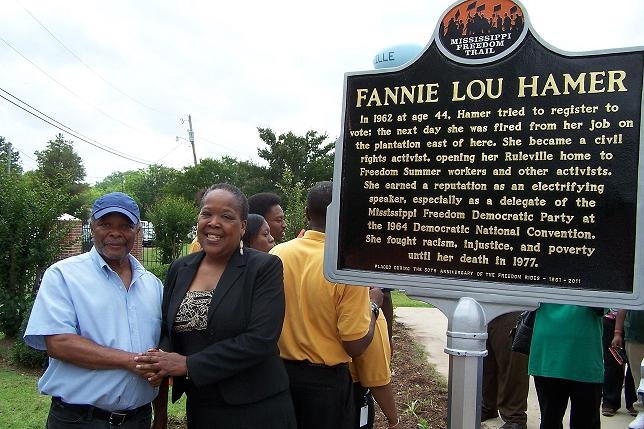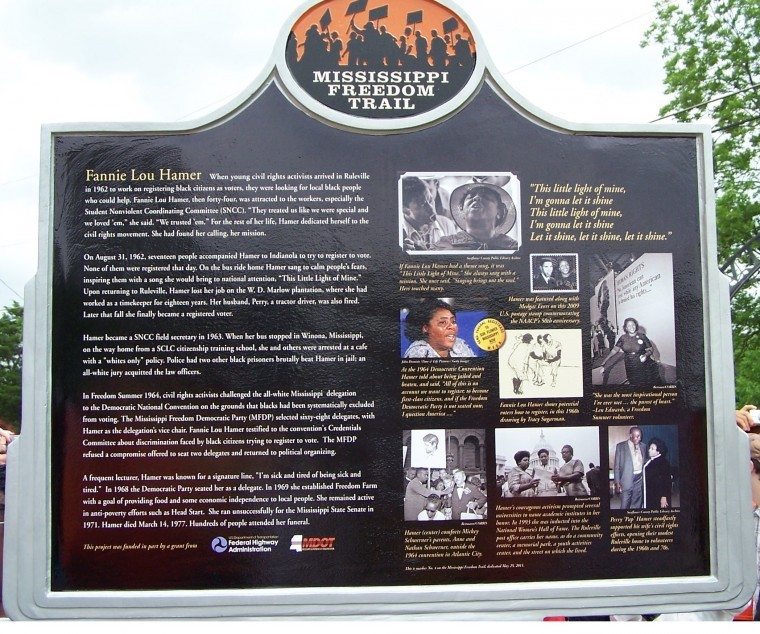RULEVILLE – For more than a hundred years, men and women, black and white have fought for various forms of democracy. Whether the fight was freedom from slavery or equality for all men – regardless of color – the fight has been a vicious and bloody battle. Hundreds of lives have been lost, but the surviving soldiers carried on, wounded emotionally, but still passionate for their cause.
Many of the martyred went unrecognized for so many years following their death. Only now has a monumental and public display by state and federal officials come forth in attempt to heal the hurt and the pain.
The state of Mississippi, which was often at the forefront of violence and brutality against the minority, has also joined in this public recognition by implementing the Mississippi Freedom Trail markers.
The Mississippi Freedom Trail, initiated by the Mississippi Development Authority (MDA), offers a virtual tour of those sites and individuals that played a pivotal role in the Civil Rights Movement.
Allen Hammons, who helped design the markers, said that honor was well overdue, and on May 25, the first marker honoring a woman, Fannie Lou Hamer, was unveiled at her gravesite in her hometown of Ruleville.
“The unveiling of the Mississippi Freedom Trail markers signaled the dawn of a new day in Mississippi history,” Hammons said. “After decades of silence, the state of Mississippi has finally recognized and honored the accomplishments of those ordinary citizens who braved enormous hardship to achieve extraordinary goals. Fannie Lou Hamer was one of them.”
The unveiling, at the Fannie Lou Hamer Memorial Park in Ruleville, was attended by supporters, family members and friends of Hamer, some of whom worked with her to change harsh southern standards.
The ceremony included songs of praise, words of reflection by state and county officials and closing remarks by Charles McLaurin, who worked with Hamer until her death in 1977.
Markers for Emmett Till and Medgar Evers preceded Hamer’s unveiling.
Hamer was born Fannie Lou Townsend in Webster County, Miss., on Oct. 6, 1917 and she later married Perry “Pap” Hamer. For most of her life, Hamer worked as a sharecropper in Sunflower County, until she attended a voter registration meeting at her church in 1962, organized by the Student Nonviolent Coordinating Committee (SNCC) and the Southern Christian Leadership Conference (SCLC).
At that meeting, Hamer was shocked to learn that blacks had the legal right to vote, and at the age of 44, she tried to register to vote at the circuit clerk’s office in Indianola. She was quickly turned away. That rejection led to her lifelong fight for equal rights in Mississippi.
On June 9, 1963, after returning from a voter registration workshop in South Carolina, Hamer and several of her friends were nearly beaten to death at the jail in Winona, Mississippi.
Her attackers were later acquitted, but Hamer continued undeterred in her fight.
Hamer’s determination, coupled with her strong voice and leadership qualities, led to the historic modification of the Voting Rights Act in 1965.
Hammons, mentioned earlier, said Hamer’s inclusion in the Mississippi Freedom Trails, is appropriate.
“Mrs. Hamer rose from relative obscurity to become one of the most recognizable symbols of the struggle for civil rights in Mississippi,” he said. “When you have the opportunity to come face to face with history that has had such an impact on all of us, it’s remarkable. And I am proud of the progress we have made. We consider this a great honor and are very pleased to be a part of sharing the remarkable history of Mississippi.”






Be the first to comment